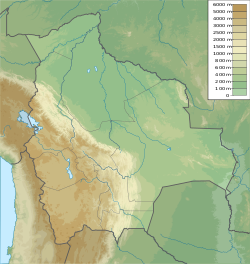| Cajones Formation | |
|---|---|
| Stratigraphic range: Turonian ~ | |
| Type | Geological formation |
| Lithology | |
| Primary | Sandstone |
| Location | |
| Coordinates | 17°36′S 63°54′W / 17.6°S 63.9°W |
| Approximate paleocoordinates | 23°24′S 41°30′W / 23.4°S 41.5°W |
| Region | Santa Cruz Department |
| Country | |
| Extent | Cordillera Oriental |
| Type section | |
| Named for | Cajones de Ichilo River |
The Cajones Formation is a Turonian geologic formation of central Bolivia. The fluvial sandstones in Amboró National Park preserve fossils of Yacarerani boliviensis.[1][2] The formation is correlated with the Adamantina Formation of the Paraná Basin in Brazil and the Bajo de la Carpa Formation of the Neuquén Basin in Patagonia, Argentina.[3]

See also
References
- ^ Novas et al., 2009, p.1316
- ^ Amboro National Park at Fossilworks.org
- ^ Novas et al., 2009, p.1319
Bibliography
- Novas, F.E.; Pais, D.F.; Pol, D.; Carvalho, I.S.; Scanferla, A.; Mones, A.; Riglos, M.S. (2009), "Bizarre notosuchian crocodyliform with associated eggs from the Upper Cretaceous of Bolivia", Journal of Vertebrate Paleontology, 29 (4): 1316–1320, Bibcode:2009JVPal..29.1316N, doi:10.1671/039.029.0409, hdl:11336/54001, retrieved 2019-03-03









